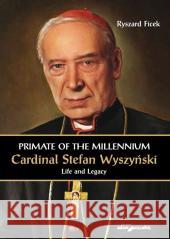Primate of the Millennium Cardinal S. Wyszyński » książka
Primate of the Millennium Cardinal S. Wyszyński
ISBN-13: 9788381804615 / Polski / 2021 / 322 str.
The above book is an interesting and instructive reading. Its educational value seems to be undeniable, and the solid chronological and methodological construction corresponds to the tried-and-tested patterns used in historical and biographical monographs. [...] The author considered it appropriate to solidly outline the religious and national context of the Primate's life, even reaching back to the distant history of the Swedish incursion, partitions of the country, regaining and building Poland's independence in the interwar period, a period of the Second World War and Nazi occupation, communist enslavement, as well as the detailed era of "Solidarity" from 1980-1981. The same applies to important ideological and socio-political phenomena like communism or democracy, which the author explained in detail while presenting the Primate's views on these issues. [...] Moreover, when reading, it seems, on the one hand, that the life of the Primate is a pretext for the story of Poland and the Church in the country on the Vistula, and, on the another hand, the story about Poland and the Catholic nation naturally sublimates, becoming the history of life and work of the Primate of the Millennium. [...] Finally, it is worth paying attention to the epilogue, which is a very good, synthetic, and factual review of the Primate's life achievements, emphasizing at the same time their importance for Poland and the Church. In this context, Primate's work was shown as a value having a significant contribution to the political, social, and religious future of Poland, as well as the entire world. Professor Jarosław R. Marczewski (Departament of Church History, The John Paul II Catholic University of Lublin)
The above book is an interesting and instructive reading. Its educational value seems to be undeniable, and the solid chronological and methodological construction corresponds to the tried-and-tested patterns used in historical and biographical monographs. [...] The author considered it appropriate to solidly outline the religious and national context of the Primate's life, even reaching back to the distant history of the Swedish incursion, partitions of the country, regaining and building Poland's independence in the interwar period, a period of the Second World War and Nazi occupation, communist enslavement, as well as the detailed era of "Solidarity" from 1980-1981. The same applies to important ideological and socio-political phenomena like communism or democracy, which the author explained in detail while presenting the Primate's views on these issues. [...] Moreover, when reading, it seems, on the one hand, that the life of the Primate is a pretext for the story of Poland and the Church in the country on the Vistula, and, on the another hand, the story about Poland and the Catholic nation naturally sublimates, becoming the history of life and work of the Primate of the Millennium. [...] Finally, it is worth paying attention to the epilogue, which is a very good, synthetic, and factual review of the Primate's life achievements, emphasizing at the same time their importance for Poland and the Church. In this context, Primate's work was shown as a value having a significant contribution to the political, social, and religious future of Poland, as well as the entire world. Professor Jarosław R. Marczewski (Departament of Church History, The John Paul II Catholic University of Lublin)











